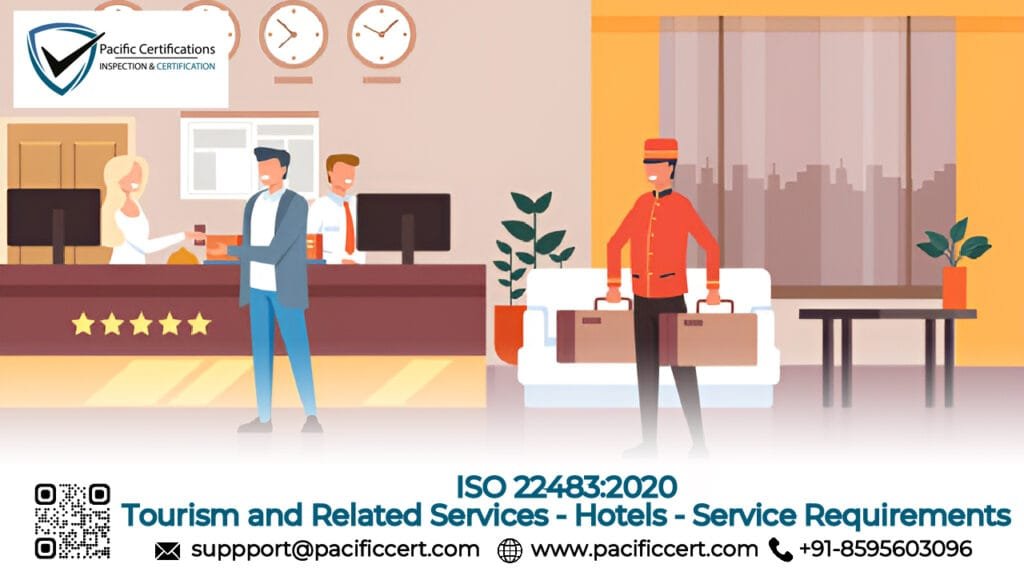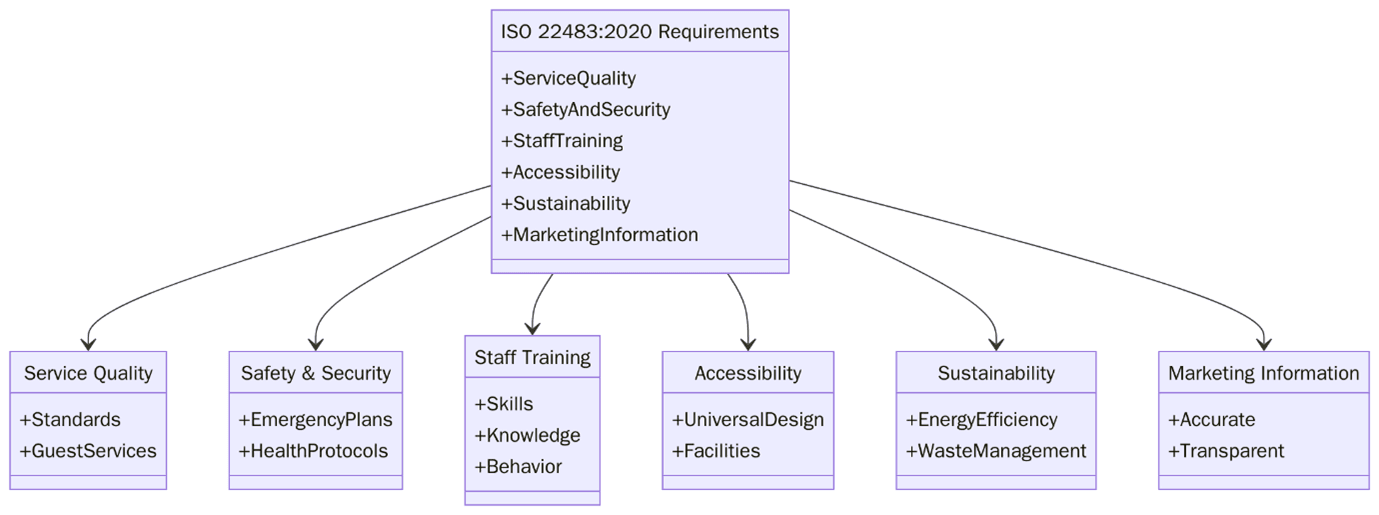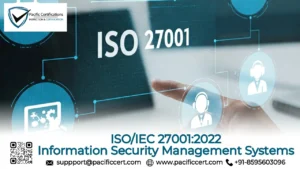What is ISO 22483:2020?

ISO 22483:2020 is an internationally recognized standard that defines quality service requirements for hotels, aiming to achieve excellence in hospitality. It outlines guidelines covering staff competence, service provision, guest safety, facility maintenance, entertainment, cleanliness, and guest satisfaction. The standard supports consistency in service delivery, regardless of hotel type, size, or location.

This standard is designed to serve as a reference for hotel operators, service providers, and tourism stakeholders seeking to improve their guest experience, maintain regulatory compliance, and align operations with global best practices. Whether a boutique inn or a luxury resort, ISO 22483 ensures a framework that balances service quality with operational efficiency.
To start your ISO 22483 certification process, please contact us at support@pacificcert.com.
Scope and Applicability
ISO 22483 applies to all types of hotels and tourist accommodations, including:
- Hotels and motels
- Resorts and retreats
- Hostels and guesthouses
- Holiday villages and serviced apartments
The standard is flexible enough to adapt to various operational models and cultural contexts, ensuring that every accommodation provider can enhance quality while respecting local traditions and hospitality styles.
To discuss how ISO 22483 fits your accommodation services, contact us at support@pacificcert.com.
Certification Process
- Gap Analysis and Initial Review:
- Compare existing operations and services against ISO 22483 requirements
- Identify areas requiring improvement and process development
- Policy Development and Planning:
- Create service policies aligned with the standard’s principles
- Define service objectives, quality metrics, and management roles
- Staff Training and Awareness:
- Develop training programs to enhance staff skills and hospitality awareness
- Educate employees about service standards, hygiene, communication, and emergency protocols
- Service Integration and Documentation:
- Integrate ISO 22483 guidelines into daily operations across departments
- Document service workflows, housekeeping protocols, and maintenance schedules
- Internal Evaluation and Improvement:
- Conduct mock audits and guest feedback surveys to measure readiness
- Implement corrective actions and performance improvements
- Certification Audit:
- Undergo an audit by a certification body like Pacific Certifications
- Address any nonconformities and finalize certification process
Begin your journey toward ISO 22483 certification by contacting us, support@pacificcert.com.
Documentation Required for ISO 22483 Certification
- Hotel service policy and organizational structure
- Staff training records and role descriptions
- Guest services and accommodation procedures
- Food safety and hygiene protocols
- Emergency preparedness and security measures
- Maintenance and cleanliness checklists
- Guest feedback management systems
Need help preparing your documentation? Contact support@pacificcert.com.
Eligibility Criteria for ISO 22483
Any organization providing accommodation services is eligible for ISO 22483 certification, especially those:
- Operating a hotel, resort, or similar facility
- Seeking to improve guest satisfaction and service quality
- Complying with national tourism regulations or international service benchmarks
- Preparing for tourism recovery or rebranding efforts
Check your eligibility with our expert at support@pacificcert.com.
Certification Costs
Certification costs vary depending on the property size, number of services, and operational complexity:
- Small accommodations or boutique hotels: Under $5000
- Mid-size or city hotels: Under $7,000
- Resort chains or large facilities: Under $10,000
Request a customized quote, contact us at support@pacificcert.com.
Certification Timeline
- Gap Analysis and Planning: 2-3 weeks
- Training and Documentation: 1-2 months
- Internal Review and Audit Prep: 3-4 weeks
- Certification Audit and Approval: 2-3 weeks
Estimated Total Duration: 2-4 months, based on organizational readiness and hotel size.
Requirements of ISO 22483:2020
To comply with ISO 22483, hotels must implement standardized systems that address the following areas:

- Human Resources: Qualified, trained, and well-supported staff with defined responsibilities and service orientation
- Guest Services: Effective front desk, reservations, information, accommodation, and baggage handling processes
- Food and Beverage: Safe, hygienic, and culturally appropriate dining experiences
- Maintenance and Housekeeping: Clean and well-maintained rooms, public areas, laundry services, and infrastructure
- Entertainment and Events: Guest-focused recreational programs and event management standards
- Safety and Security: Risk management, emergency protocols, surveillance, fire safety, and health measures
- Guest Satisfaction Management: Tools for feedback collection, analysis, corrective actions, and continuous improvement
Need implementation support for these requirements? Contact us at support@pacificcert.com.
Benefits of ISO 22483 Certification
- Standardized services lead to greater consistency, comfort, and satisfaction
- Demonstrates commitment to global quality standards and customer service
- Streamlined procedures reduce errors, delays, and miscommunication
- Helps attract international guests, tour operators, and corporate clients
- Aligns with tourism and public health regulations
- Clear roles, training, and feedback mechanisms improve team performance

In today’s competitive hospitality landscape, travelers expect consistent service quality, safety, and hygiene—regardless of destination or accommodation type. ISO 22483 responds to:
- Post-pandemic tourism quality and safety assurance
- Rising importance of customer feedback and online reviews
- Globalization of travel and increasing international guest expectations
- Growing reliance on standardized systems for digital bookings and sustainability
Hotels that adopt ISO 22483 are better positioned to recover post-COVID, enter international markets, and deliver superior guest satisfaction.
How Pacific Certifications Can Help
We support hotels and hospitality providers by offering:
- ISO 22483 gap assessments and readiness checks
- Customized documentation and policy frameworks
- Onsite or virtual staff training programs
- Pre-certification audits and final certification audits
- Post-certification guidance and annual surveillance support
Contact support@pacificcert.com to begin your ISO 22483 certification process today!
Frequently Asked Questions (FAQs)
Is ISO 22483 certification mandatory?
No, but it is highly beneficial for hotels seeking quality recognition and global market competitiveness.
Can small hotels or guesthouses implement ISO 22483?
Yes, the standard is scalable and adaptable for smaller properties and boutique operations.
Does ISO 22483 address food safety?
Yes, food hygiene, staff hygiene, and safety protocols for food and beverage operations are included.
Can ISO 22483 integrate with other standards?
Yes, it complements ISO 9001 (Quality), ISO 45001 (Health & Safety), and ISO 22000 (Food Safety).
How often is certification renewed?
Certification is typically valid for 3 years, with annual surveillance audits to ensure continued compliance.
Ready to get ISO 22483 certified?
Contact Pacific Certifications to begin your certification journey today!
Suggested Certifications –






